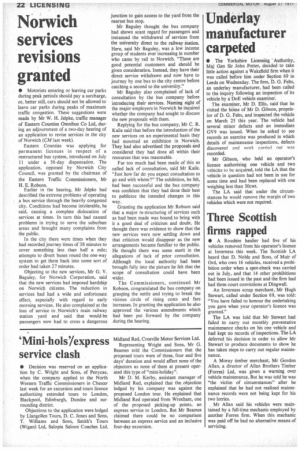Norwich services revisions granted
Page 24

If you've noticed an error in this article please click here to report it so we can fix it.
• Motorists entering or leaving car parks during peak periods should pay a surcharge, or, better still, cars should not be allowed to leave car parks during peaks of maximum traffic congestion. These suggestions were made by Mr W. H. Jelpke, traffic manager of Eastern Counties Omnibus Co Ltd, during an adjournment of a two-day hearing of an application to revise services in the city of Norwich (CM last week).
Eastern . Counties was applying for permanent licences in respect of a restructured bus system, introduced on July 11 under a 56-day dispensation. The application, opposed by Norwich City Council, was granted by the chairman of the Eastern Traffic Commissioners, Mr H. E. Robson.
Earlier in the hearing, Mr Jelpke had described the extreme problems of operating ,a bus service through the heavily congested city. Conditions had become intolerable, he said, causing a complete dislocation of services at times. In turn this had caused problems in trying to serve the suburban areas and brought many complaints from the public.
In the city there were times when they had recorded journey times of 38 minutes to cover something less than half a mile; attempts to divert buses round the one-way system to get them back into some sort of order had taken 27 minutes.
Objecting to the new services, Mr G. V. Baguley, for Norwich Corporation, said that the new services had imposed hardship on Norwich citizens. The reduction in services had had a wide and unfortunate effect, especially with regard to early morning services. He also complained at the loss of service to Norwich's main railway station yard and said that would-be passengers now had to cross a dangerous junction to gain access to the yard from the nearest bus stop.
Mr Baguley thought the bus company had shown scant regard for passengers and instanced the withdrawal of services from the university direct to the railway station. Here, said Mr Baguley, was a low income group of students ever increasing in number who came by rail to Norwich. "These are good potential customers and should be given consideration. Instead, they have their direct service withdrawn and now have to journey by one bus to the city centre before catching a second to the university."
Mr Baguley also complained of lack of consultation by the bus company before introducing their services. Naming eight of the major employers in Norwich he inquired whether the company had sought to discuss the new proposals with them.
Replying for the bus company, Mr C. R. Kaile said that before the introduction of the new services on an experimental basis they had mounted an exhibition in Norwich. They had also advertised the proposals and considered they had done all within their resources that was reasonable.
Far too much had been made of this so called lack of consultation, said Mr Kaile. "Just how far do you expect consultation to go and with whom?" The exhibition, he felt, had been successful and the bus company was confident that they had done their best to publicize the intended changes in this way.
Granting the application Mr Robson said that a major re-structuring of services such as had been made was bound to bring with it a good deal of criticism and doubt. He thought there was evidence to show that the new services were now settling down and that criticism would disappear as the new arrangements became familiar to the public. He thought there was some merit in the allegations of lack of prior consultation. Although the local authority had been brought fully into the picture he felt that the scope of consultation could have been wider.
The Commissioners, continued Mr Robson, congratulated the bus company on grasping the nettle and trying to break the vicious circle of rising costs and fare increases. In granting the application he also approved the various amendments which had been put forward by the company during the hearing.




















































































